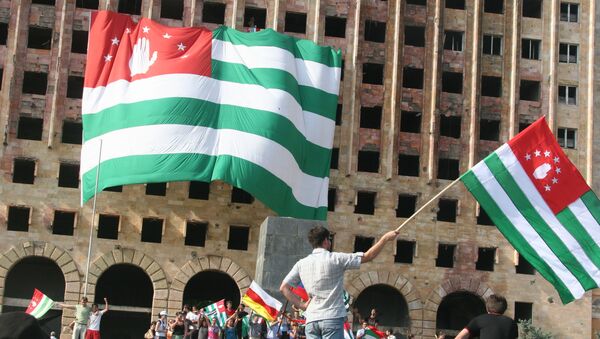MOSCOW, October 28 (RIA Novosti) — The present relations between Georgia and Abkhazia, the Abkhazia's plans to break all the relations with Georgia are caused by the Georgia's policy during the last few years, Andrei Sushentsov, a Russian political expert, told RIA Novosti Tuesday.
"Over the last 23 years Georgia has been searching for solutions to their problems in its opposition to, and not in cooperation with Russia. It has been searching for solutions somewhere in Europe or the United States. Now, however, Georgians are reaping the harvest of their policy," Sushentsov, a specialist on conflict situations in the Caucasus and senior analyst of the Foreign Policy Analysis Group said, commenting on the current prospect of Russia-Abkhazia integration.
Earlier in October, the parliament of Abkhazia began consideration of an agreement prepared by Russia "On the cooperation and integration" of Russia and Abkhazia. Georgia fiercely opposed the proposal calling it an attempt by Russia to annex Abkhazia, which it considers to be part of its territory under Russian occupation.
"At the moment it is evident that Abkhazia's policy is running in a direction away from Georgia. Abkhazians view Georgia as a rival state, not only because of the conflict between Georgia and Abkhazia, but also because Georgia is Russia's adversary and considers itself part of alternative projects to Russian ones. It seeks membership of the EU and NATO," Sushentsov explained.
The expert noted that until now Tbilisi had been keeping alive hopes that at some point Abkhazia would ask to become part of Georgia again. The Georgian establishment has counted on being an attractive proposition to Abkhazians after the so-called "European experiment", as well as on the change in Abkhazia's political line after new forces come to power there.
"Nevertheless, Georgia is not ready to sacrifice any of its aspirations, its hopes for NATO membership in particular, for the sake of reunification with Abkhazia. Georgia cannot propose anything interesting to Abkhazians," the analyst noted.
Russia, on the contrary, has proposed cooperation and integration.
"Georgia's current strong reaction is first of all caused by the fact that the new treaty envisages the formation of an integrated structure similar to a joint military grouping, military command of which will be given to Russia in the case of an external threat. Moreover, customs control will be moved from the Russia-Abkhazia boundary to the Abkhazia-Georgia boundary, which, in fact, deprives Georgia of any chance to maintain the status quo in the region that has been held for 23 years," Sushentsov said.
In general, the expert is positive about the prospects of the agreement on the cooperation and integration.
"This agreement is not related to Georgia in any way. It is purely an issue of bilateral relations between Russia and Abkhazia. … The current vocal opposition of Georgia will not have far-reaching consequences," he concluded.
David Petrasek, a human rights watchdog, who had previously worked for such prominent organizations as the Office of the UN High Commissioner for Human Rights and Amnesty International among others, believes that almost all western countries still consider Abkhazia to be part of the territory of Georgia, and do not recognize the Abkhaz declaration of independence.
"Those with a sensible policy have long urged the Georgian government to negotiate in good faith with the Abkhaz authorities with a view to meeting their legitimate grievances, and to grant Abkhazia considerable autonomy, but within a unified Georgian Republic," Petrasek said.
The human rights expert noted, that the integration between Russia and Abkhazia is "bound to be viewed skeptically by western countries" in the light of Crimea"s reunification with Russia and recent events in Ukraine.
"They will see it as a thinly-disguised effort on Russia's part, even if this is not its intention, to eventually encourage Abkhazian political integration with Russia," the expert claimed.
"Russian officials point to the views of the Abkhazians, a majority of whom appear to insist on their independence from Georgia, and closer ties to Russia. This is, of course, an important point. But if Abkhazian independence, or indeed its eventual political union with Russia, is to be achieved without political negotiation and the agreement of all key stakeholders, including of course the Georgian government, then it is unlikely that peace and prosperity will come to the Abkhazians or the region," Petrasek stated.
Georgia's Council of National Security is holding a meeting on Tuesday to discuss the military aspect of cooperation between Russia and Abkhazia under the proposed agreement "On the cooperation and integration".
Following Russia's recognition of the independence of South Ossetia and Abkhazia, Georgia severed diplomatic relations with Russia. In Georgia, the regions South Ossetia and Abkhazia hold occupied territories status. The new Georgian government formed in 2012 called the normalization of relations with Russia one of its key priorities.

